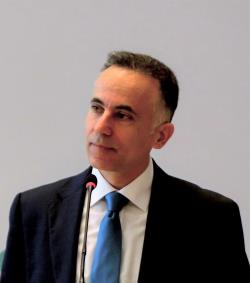Inclusive AI For A Better World, Through Cross-Cultural And Multi-Generational Dialogue
Globethics
Session 166
During WSIS 2023, Globethics organized an international Workshop on Data Ethics, and launched a related collective publication on the topic with the contribution of 45 experts from all over the World. Globethics also created an International and Inclusive Policy Dialogue Framework on Ethics of AI, with the participation of Civil society, young experts, and practitioners, in addition to Academia, Private Sector, Governments, and Multilateral System. The outcome of this dialogue is a Policy Report that has been presented at the UNESCO Global Forum on the Ethics of AI (Feb 2024 - Slovenia).
In the framework of the WSIS+20 in Geneva, Globethics is organising a Session on: Inclusive AI For a Better World, Through Cross-Cultural and Multi-Generational Dialogue.
Five Speakers (from Latin-America, Africa, Asia, and Europe), with the Executive Director of the organization as Moderator, will engage in a dialogue representing the diverse societal and cultural perspectives, and bringing the voice and expectation of the young and future generations.
The session aims to explore how AI can be more inclusive of people, cultures, sciences, and institutions, fostering interdisciplinary collaboration and promoting ethical practices. Participants will engage in discussions to exchange insights and contribute to a more equitable AI landscape, reflecting on the following questions: What are the main AI related opportunities and ethical challenges for the current and future generations? What is needed to make AI an opportunity for all, and avoid deepening the divide within and between societies? Can AI contribute to better achieve a sustainable and inclusive development for all? What are the needed policies, instruments, and resources to achieve this?

Executive Director of Globethics, international organization, which head office is in Geneva, Switzerland, working for ethical leadership through higher education and global engagement. Prof. Fadi Daou is Laureate of the Elevate Prize 2020 for Global thinkers and change-makers. Daou is a Policy advisor and Professor in geopolitics of religions, inclusive development, and peace. Having lead pioneer projects for countering online extremism, he now leads the engagement of Globethics in ethics of AI and emerging technologies, with the recent publication: Inclusive AI for a better future.

Diana Nyakundi is an AI Research Fellow. She holds a Bachelor of Laws degree from the University of Nairobi; a Post-Graduate Diploma in Law from the Kenya School of Law; and an Executive Certificate in Law, Policy and Technology from the IE University in Spain. She is also a graduate AI Policy Fellow from the Lawyers Hub and she holds an AI Policy Analyst Certification from the Center for Artificial Intelligence and Digital Policy (CAIDP).

Michel Roberto de Souza. Public Policy Director at Derechos Digitales. PhD in Law and Masters in Law from the University of São Paulo. Bachelor of Law from the State University of Maringá (UEM). LL.M. of Comparative Law and Economics from the International University College of Turin (IUC). He works in the area of law and society, working especially on issues related to data protection, social participation, human rights and technology, access to justice and artificial intelligence.

Larissa Zutter is currently a Board Member and Senior AI Policy Advisor at the Center for AI and Digital Policy. She has been with CAIDP since it’s inception and has also worked at different organisations both in the public and private sector like the the UN, Novartis and the Michael Dukakis Institute. She has a bachelors degree in Economics, Business and Political Science from the University of Basel and a Dual Masters Degree in International Security and International Political Economics from Sciences Po and LSE. Her research has focused on the socio-economic effects of AI on a societal, economic and business level.

Mr. Xiaowu Ma currently works at Qingsong Health Group, where he has played a pivotal role in guiding the company from its inception to full establishment. Throughout his career, he has received numerous accolades, including "China's Top 10 Brand People," "The Exemplary Person for Brand Powerhouse Innovation," "China's Brand Person of the Year," and the "China Advertising Creative Media Award."
Before joining Qingsong Health Group, Mr. Ma was a founding team member of Jumei Youpin (Jumei International Holding Ltd). Under his leadership, Jumei Youpin became the fastest internet cosmetics e-commerce company in China to be listed on the New York Stock Exchange (NYSE) within four years.

Vice Dean of the Institute for AI International Governance (I-AIIG) and Deputy Director of the Center for International Security and Strategy (CISS) at Tsinghua University.
-
 C1. The role of governments and all stakeholders in the promotion of ICTs for development
C1. The role of governments and all stakeholders in the promotion of ICTs for development
-
 C2. Information and communication infrastructure
C2. Information and communication infrastructure
-
 C3. Access to information and knowledge
C3. Access to information and knowledge
-
 C4. Capacity building
C4. Capacity building
-
 C7. ICT applications: benefits in all aspects of life — E-government
C7. ICT applications: benefits in all aspects of life — E-government
-
 C10. Ethical dimensions of the Information Society
C10. Ethical dimensions of the Information Society
-
 C11. International and regional cooperation
C11. International and regional cooperation
C10. The WSIS Action Lines stated that the Information Society should be subject to universally held values and promote the common good and to prevent abusive uses of ICTs. It also invited relevant stakeholders, especially the academia, to continue research on ethical dimensions of ICTs (#25). Despite the progress done in this field, the knowledge development and dissemination in relation to Data and AI Ethics is nowadays a crucial challenge. Globethics has been created in 2004 in synergy with the WSIS framework and Action lines. The organisation has been responding to this need through research, publication, formation, and policy engagement, making from Ethics of digital and emerging technology one of its top priorities, and in continuous synergy and collaboration with WSIS, ITU and UNESCO.
-
 Goal 4: Ensure inclusive and equitable quality education and promote lifelong learning opportunities for all
Goal 4: Ensure inclusive and equitable quality education and promote lifelong learning opportunities for all
-
 Goal 10: Reduce inequality within and among countries
Goal 10: Reduce inequality within and among countries
-
 Goal 16: Promote just, peaceful and inclusive societies
Goal 16: Promote just, peaceful and inclusive societies
-
 Goal 17: Revitalize the global partnership for sustainable development
Goal 17: Revitalize the global partnership for sustainable development